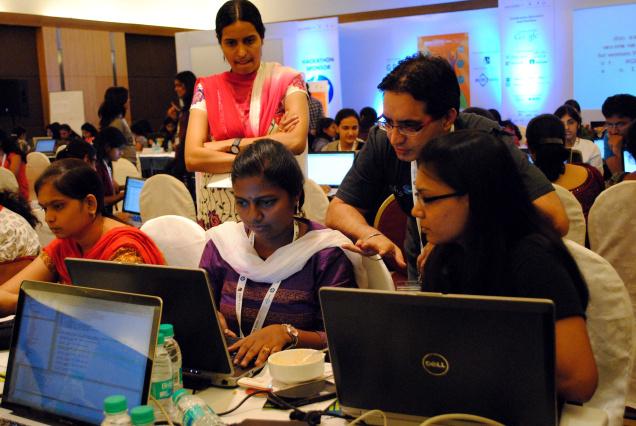BANGALORE, November 15: Every third day in Bangalore, technology groups, communities and companies organise a hackathon. Some have agendas to promote a platform or company, while others are looking to encourage code contribution to community projects. But what they all have in common is that women are poorly represented.
Optimistic picture
This is why the second Grace Hopper hackathon on Wednesday presented a pretty optimistic picture. The room was teeming with around 120 technologists from across the city, gathered to code on open source platforms. Divided into three groups, these women set out to code from a scratch to develop three “humanitarian projects”, including a custom crowd sourced map to showcase safe locations in an area (and map safe/unsafe areas), a free financial service system for micro finance institutions and a clinical reminders system for people to manage their medical appointments.
Rekha Joshi, a participant from Intuit, said that in earlier editions they were just submitting patches to existing code bases. “But here we started out with an empty code base. The project is really tech intensive, and very challenging,” she said. With the Android SDK (Software Development Key) as a base, the group used open source tools to code a GPS-linked application. “It is a very essential product given the times we live in,” she said. Having spent 11 years in the field, she says she finds things looking up for women. “Events like this also encourage women or gets them interested in tech,” she said.
Encouraging scenario
Neetha Devaraj, a Yahoo employee who has been coding for 10 years now, says that when she first joined the profession there were hardly any women managers or those working in research. “There were maybe one or two team leads who were women. Today, there are a lot more women and that is encouraging for the younger lot,” she says. She has been working on the clinical reminders project, and said though she participated in many internal hackathons, coming out here was a special experience. “On proprietary platforms within our companies, things are just there for us to use. Here we have to figure things out as we go and it’s certainly challenging.”
This hackathon is part of the ongoing three-day conference organised by the Anita Borg Institute in association with the Association of Computing Machinery India (ACM India). Geetha Kannan, India head of the ABI, said it was a “resounding success”. “Thanks to some high-spirited women in India and around the world, women in technology are no longer in the shadows. The days of ‘male-only coding platforms’ are gone and will hopefully never come back.”

